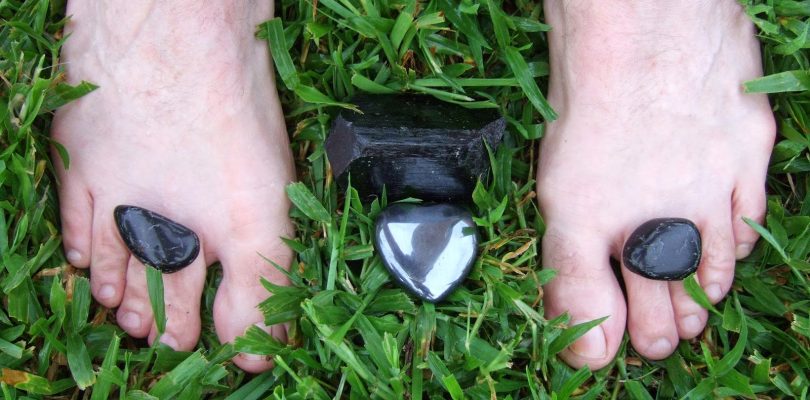For so many people, the world feels large, frightening, and difficult. This feeling causes then to shrink into protective little bubbles as a way of self-protection. This feeling of being without purpose and meaning is what it means to be ungrounded or untethered. For those that live years or lifetimes in this way, but the good news is there are many grounding techniques that can help us focus on both body and surroundings and stay present in the moment. The exercises covered in this article can be used to calm the emotions, stop overthinking, clear the mind, and live in the moment, judgement free. Grounding exercises are helpful when stressed out, anxious, or even just unfocused.
Grounded or Ungrounded
The difference in being grounded and not is summed up in a single word, presence. When someone is grounded, it is in all three aspects: mentally, physically, and spiritually. The mental grounding allows you to have the space and time to properly review every new idea, thought, or question you encounter. Physically speaking, you will have the sensations of taste, sight, smell, hearing, and taste at the moment it happens. As for spiritual grounding, you can feel your emotions with the freedom to dissect and reshape beliefs as needed. Being grounded means living in yourself at the moment from head to toe, heart and gut as you experience the world actively and in the moment, not through memories.
Being ungrounded means that you are basically renting space in your body and mind, not taking control, and owning it. This leaves someone to live life as if passively watching it happen rather than living with intent. Ideally, we start in being grounded as children as we connect and attach to the world around us. We fully experience every laugh, taste, fight, and though to the absolute. This is not intensity, but a stretching of every moment as far as possible before moving forward to the next. Even those who are shy or quiet can be grounded. In fact, they typically are the most grounded.
However, many slowly start to lose the groundedness over time. This is typically associated with a defense known as dissociation. We train ourselves to live outside reality so we do not have to face our fear and problems in that moment. This is escapism that is made worse by a world that allows for multiple distractions at every moment. The fear of reality leads to being ungrounded. It requires bravery to admit this and work against it to become grounded once again.
Is Grounding Important?
Grounding can help all of us. You do not need to have a mental breakdown to use them, just know you need to be more present in your own life. Our modern lifestyle has made it nearly impossible to live grounded. There are too many distractions. Some may say we all have ungrounded moments, which is true, but whether you find your way back to grounded or not is dependent on whether you realize you have become ungrounded.
There are a few signs that point to being ungrounded. It happens slowly, so we must notice the small difference in how we start interacting with the world. If we get too comfortable with being ungrounded, it will start to feel normal. For those who are trapped in an ungrounded area long term, they may only realize the condition when something revelatory arises. Some call this “hitting rock bottom”. Several of the subtle signs are listed below.
Physical Signs
- Stepping on things – This is a literal stepping on things that have accumulated on the floor because you feel yourself unable to pick things up and change their physical level.
- Extra sensitivity – This sensitivity to hot or cold is also a signal. If you are struggling to stay warm, especially in the extremities, then it can be a signal of ungrounding.
- Clumsiness – If you have become newly clumsy, walking into door, tripping, and stubbing toes, and have unreliable coordination, you may be ungrounded.
Mental Signs
- Spacing out – Minutes seem to be hours and hours are actually days as they blend together with no discernable events as separation, then you are likely ungrounded.
- Lack of conversational focus – When you seem to have lost the ability to both speak and receive conversation or follow what is being said, then you are likely ungrounded. This can happen even if you are typically a great speaker and listener. People may tell you that you are not making sense, even if you believe you are being clear.
- Distracted from plans and goals – You may be unable to focus on a single goal or objective, even if it is just a movie. Other things seem to pop into your thoughts unexpectedly.
Spiritual/Emotional Signs
- Sensitivity – You may feel agitated around other people or cringe at the idea of spending time with others when unnecessary, even those very close to you. This may have been fun months ago, but now seems unbearable.
- Fearfulness – Fear can take over with even favorite scary movies being too much. Perhaps sleeping with the lights off is now scary. You may also be more obsessed with personal mortality.
- Daydreaming – This is more than spacing out, it is allowing your mind to go into dream worlds while still awake. You may lose hours just staring at a screen or out a window, not looking at anything in particular. You often do this because you no longer care about the real world.
Grounding Techniques
The great news is that even is untethered, it is possible to re-ground yourself and reclaim control. It serves as a signal for the mind, body, and soul that you are finally ready to pay attention and truly experience things in the moment. Below are a few techniques to follow to create groundedness through physical, mental, and spiritual ways. Use techniques for each area or just for the one that is the weakest in your life. This will help you regain focus.
Physical Techniques
Goal: The five physical senses are reminders to remain in the present and experience every sensation as it comes. Use the techniques to engage with your surroundings and enjoy each and every aspect to anchor your own state of being. Registering this allows the brain to understand facts for what they truly are in the moment.
- Five senses meditation – Anxiety easily evolves from harmless to desolation through a snowball effect that can impact life’s quality. Use five senses meditation to focus on one thing and experience it intensely using all five senses. For example, use your morning showering routine to pay attention to the feel of the water droplets, the smell of the shampoo, the sound of water hitting the tub, the bubbles popping, and when you get out, the feeling of the towel as you brush your teeth.
- Hot/Cold foods – Try using extremes for the senses by eating something really hot, then something very cold and truly feeling the experiences. Sweet and sour also work.
- Meditation walk – Take a 15-minute walk with complete mind-muscle connection for every step. Feel each muscle work with ever step.
- Deep breathing – Use intentional breathing to take in a deep breathe and feeling the lungs expand, the breath going in and out.
- Water – Use running water in the sink to place your hands under it and feel the gradual temperature change.
- Ice – Hold a piece of ice in your hand to feel the intense cold, watch it melt, and feel what it does to your body.
- Savor a scent – Find a scent you enjoy, tea, spice, soap, and inhale the fragrance slowly and deeply to savor it and know how it makes you feel in that moment.
- Get moving – Get your body moving to truly get in tune with the senses. Try exercising or stretches, jumping, jogging, or even dancing. Focus on how each muscle feels with the different movements.
- Listen – Stand outside and simply listen. Hear the birds, cars, the wind, or whatever else is making noise. Take each in fully and separately.
- Feel the body – Lie down and try to release the tension in one part at a time. As you do, take time to feel each part separately as you flex and release.
- 5-4-3-2-1 method – Perfect for anxiety attacks, work backwards from 5 using your senses. List 5 things you see, 4 you hear, 3 you can touch, 2 you smell, and then 1 you can taste.
Mental Grounding
Goal: With a compromised mental state, it may be hard to focus on simple tasks like driving or cooking. You may suddenly find yourself confused and less capable due to lack of focus. This affects productivity and proactiveness eventually ending in stagnation. Mental grounding techniques chip away at these blocks through non-demanding mental exercises so you can sharpen your mind.
- Daily declaration – The brain can easily become overwhelmed by growing responsibilities and obligations in our busy society. So, start each day with a grounding declaration like: “My name is ______, I live in ___________, I am doing ___________ because I __________. I am grounding myself in reality.” Detail what your body is feeling and what is happening in that moment.
- Journaling – Write down your thoughts, emotions, and ideas so they can move from repressed emotions to actionable concepts.
- Memorize and recite something – Spend time training your mind through memorization. This can be anything you enjoy like a poem, song lyrics, or a speech.
- Categorical thinking – Come up with two simple categories, like clothes and cars, and list as many things that fall into each category as you can in one minute.
- Math and numbers – Math helps center us on the moment so run through all your times tables or count backwards from 100 by twos to get centered.
- Visualize – Think of a task you enjoy and visualize doing it from start to finish.
- Laugh – Laughing helps you relax and feel good, keeping you present. Find a way to make yourself laugh.
- Describe – Take time to use your five senses to describe something going on around you or a task you are good at in great detail.
- Picture someone – Close your eyes and picture someone who makes you feel calm. Imagine their face and voice as they tell you things will be okay.
- Pets – Spending time with a pet is grounding as you pet their fur and notice special characteristics about each one.
- Favorites – Think of three categories of things you like and list three for each category.
- Favorite place – Visit your favorite place or if unable to visit, imagine it and think about the feelings you have when there.
- Activity – Plan an activity and visualize the details ahead of time. Make sure it is something enjoyable.
- Walk away – Though you cannot physically walk away from many problems, sit down, and visualize a problem then visualize yourself walking away from it and it shrink away and disappear.
Spiritual Techniques
Goal: The goal is to focus on self-care as you are kind and gentle to yourself. Love yourself and be forgiving to yourself so you can relax and be kinder to others. We deserve self-love in this chaotic world.
- Earthing – Though the name sounds odd, earthing is actually feeling the earth on bare feet. Kick off your shoes and walk barefoot in the dirt. Relax and feel the sensations throughout your body.
- Sweat – Work out in ways that push the body and cause you to sweat. This cleanses the body and forces us to focus on the moment.
- Be kind to yourself – Learn to care about and for yourself to relax, even if mistakes are made, forgive and move on.
- Touch something – Find a comforting blanket, pillow, t-shirt or whatever and hold it, feel it, and relax in its comfort.
- Gratefulness – Take time each hour to write one thing you are grateful for and then review at the end of the day.
- Music – Music is healing so put on your favorite song or one that helps you relax and enjoy. Pay close attention to the body sensations, words, and sounds of your favorite parts.
- Others – Ground yourself by helping others so you can focus on them. It will help you relax so you can be present in the moment.
Choose the techniques that work best for you and stick with them. Be brave and give them a chance to work without trying to force anything. Some techniques will feel odd or uncomfortable at first, but being ungrounded is why they feel weird. Work against your internal habits to bring yourself back to the present. It takes time and training, but it is possible.




